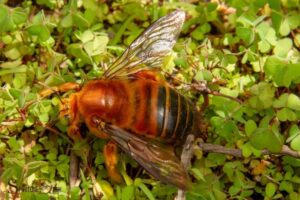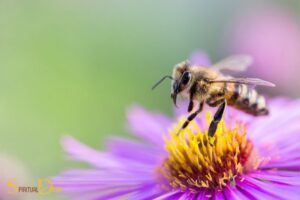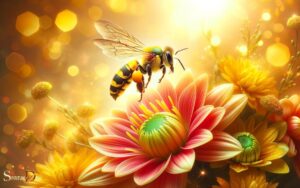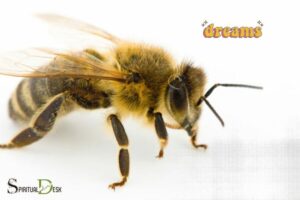Spiritual Lessons from Honey Bees: Resilience!
Honey bees are more than just honey producers; they are tiny creatures that offer valuable spiritual lessons such as the importance of unity, hard work, resilience, and sacrifice for the greater good.
Honey bees live in a hive, working together as a group to carry out their daily tasks in a unified manner.
This represents the spiritual lesson of unity and cooperation. Bees also work tirelessly to gather nectar and process it into honey, emphasizing the importance of hard work and diligence.
Furthermore, bees can endure harsh conditions and still survive, embodying resilience.
Lastly, they are known to sacrifice their own lives to protect the hive, teaching us about selfless love and sacrifice.
Benefits of Honey Bees:
Honey bees remind us that individual effort alone is not enough to sustain a community. Instead, it is the commitment of all members that allow it to thrive.
We can take this lesson and apply it to our spiritual lives, recognizing the importance of respecting and working together with others of different beliefs to ensure our faith communities are strong.
With this understanding, we can be better equipped to strengthen our spiritual identity and foster a more loving society.
7 Spiritual Lessons From Honey Bees
| Spiritual Lesson | Explanation |
| Unity and Harmony | Honey bees live in a hive that works together as a single unit. This can teach us the importance of living in harmony with others. |
| Working towards a common goal | Each bee has a role to play, from searching for nectar, to protecting the hive. This unity of purpose can inspire us to collaborate with others towards shared goals. |
| Selflessness | Bees work tirelessly for the good of the hive, not for individual gain. We can learn the value of selflessness and service from this. |
| Communication | Bees use a ‘waggle dance’ to communicate locations of food sources to each other. This highlights the importance of effective communication in our lives. |
| Resilience | Bees face many challenges including predators and harsh weather but continue working. This can remind us to remain resilient in the face of adversity. |
| Order and Discipline | The hive functions smoothly because every bee performs its role efficiently. This can inspire us to be disciplined and maintain order in our own lives. |
| Adaptability | Bees adapt their behavior based on the needs of the hive, for instance, workers can become queen if needed. This demonstrates the importance of flexibility and adaptability. |
Key Takeaway
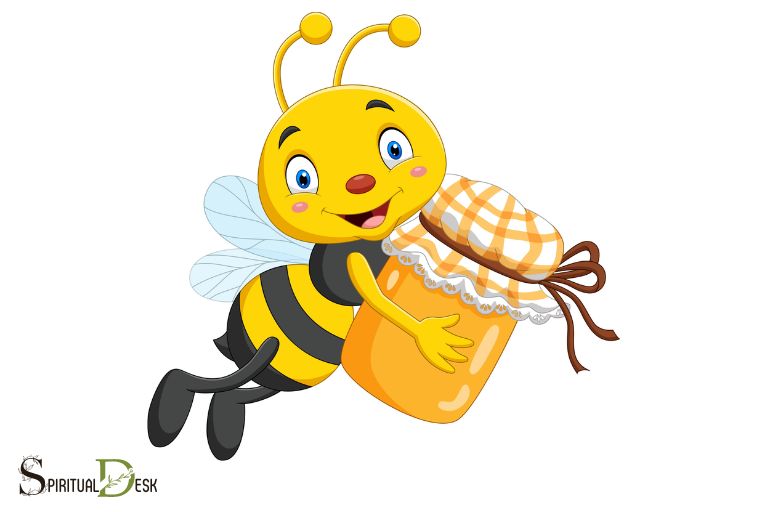
Five Facts About: Spiritual Lessons From Honey Bees
The Importance Of Honey Bees In Nature
Spiritual Lessons From Honey Bees
Bees are more than just tiny creatures that buzz around flowers. They play a vital role in the ecosystem and have valuable spiritual lessons to teach us.
One of the most remarkable aspects of honey bees is their importance in nature.
Let’s explore the role of honey bees in pollination, how they contribute to biodiversity, and the impact they have on food production.
The Role Of Honey Bees In Pollination
Pollination is an essential process that allows plants to reproduce and thrive. Honey bees, with their unique ability to carry pollen from one flower to another, play a crucial role in this process.
Here are some key points to highlight:
- Honey bees are efficient pollinators because they collect nectar from flowers for honey production. During this process, pollen sticks to their bodies and gets transferred to other flowers as they move along.
- They are responsible for pollinating a significant number of flowering plants, including fruits, vegetables, and nuts. Without honey bees, many of our favorite foods would not exist.
- The act of pollination helps in the formation of seeds and fruits, ensuring the continuation of plant life cycles.
- Honey bees also contribute to the diversity of plant species by facilitating cross-pollination, where pollen from one plant fertilizes another plant of the same species.
How Honey Bees Contribute To Biodiversity?
Biodiversity is the variety of life on earth, including different species of plants, animals, and microorganisms. Honey bees play a vital role in maintaining biodiversity.
Here are the key points to consider:
- Honey bees visit various types of flowering plants, aiding in the transfer of pollen and facilitating the reproduction of different plant species.
- By pollinating a wide range of plants, honey bees contribute to the genetic diversity within plant populations. This genetic diversity helps plants adapt to changing environmental conditions and promotes their overall health and survival.
- Many animals rely on the fruits, seeds, and nectar produced by plants that are pollinated by honey bees. The interconnectedness between honey bees, plants, and other organisms creates a balanced ecosystem.
The Impact Of Honey Bees On Food Production
The significance of honey bees in food production cannot be overstated. They are responsible for supporting the growth of numerous crops that nourish populations worldwide.
Consider the following points:
- Honey bees are responsible for pollinating a variety of fruits, such as apples, oranges, and strawberries, ensuring their successful reproduction and abundant harvest.
- Many vegetables, including cucumbers, zucchinis, and tomatoes, depend on honey bee pollination to produce high-quality fruits. Without their pollination services, crop yields would be significantly reduced.
- Honey bees also contribute to the production of nuts, such as almonds and pistachios, which are not only delicious but also nutritious.
- Their impact on food production extends to animal agriculture as well. Bees pollinate alfalfa, a vital forage crop, providing food for livestock like cows.
Honey bees play an invaluable role in nature. Their contribution to pollination, biodiversity, and food production highlights their significance in maintaining the delicate balance of our ecosystems.
As we appreciate the lessons honey bees have to offer, let us also strive to protect and care for these incredible creatures.
The Wisdom Of Honey Bee Communication
The intricate dance language of honey bees:
Honey bees have a remarkable form of communication known as the “waggle dance”, which they use to convey important information to their fellow hive members.
This dance is a fascinating display of their ability to communicate complex details about food sources, including distance, direction, and quality.
Here are key points to understand about this intricate dance language:
- The waggle dance is performed by worker bees inside the hive to communicate the location of nectar, pollen, or water sources to other bees.
- This dance involves two main components: The “waggle run” and the “return loop”. The waggle run is a straight line dance that indicates the direction of the food source, while the return loop signifies the location of the hive.
- The duration of the waggle run and the angle at which it is performed provide information about the distance to the food source. A longer waggle run suggests a greater distance, while a steeper angle represents a different direction.
- The dance also conveys information about the quality of the food source. The level of enthusiasm and vigor with which the dance is performed indicates the desirability and abundance of the resource.
- Honey bees have the remarkable ability to interpret and decode these dance movements to navigate and locate valuable food sources.
How honey bees communicate for the greater good of the hive:
In a honey bee colony, effective communication is crucial for the survival and success of the entire hive.
These small insects have developed a sophisticated system of communication that ensures the well-being of the collective.
Here are the key points to understand how honey bees communicate for the greater good of the hive:
- Honey bees communicate through a combination of pheromones, dances, and body language. These different forms of communication help convey information about food sources, hive health, and potential dangers.
- Pheromones play a significant role in hive communication. For example, the queen bee emits pheromones that keep the colony united and cohesive. These pheromones also influence the behavior of worker bees and help maintain social harmony.
- Honey bees use different signals and movements to indicate potential threats. The “stop signal” involves bees rapidly vibrating their bodies to notify others of imminent danger, such as an approaching predator. This communication allows the hive to quickly respond and protect itself.
- Bees also communicate information about the availability of resources within the hive. When a forager returns with nectar or pollen, she shares it with other bees through a process called trophallaxis. This exchange of food helps spread vital nutrients and sustains the entire colony.
- By effectively communicating with each other, honey bees ensure the collective success of the hive. Their intricate system of communication allows them to adapt, respond to challenges, and thrive in their environment.
Lessons in teamwork and effective communication from honey bees:
Honey bees provide valuable lessons in teamwork and effective communication that can be applied to various aspects of our lives.
Here are key points to learn from honey bee communication:
- Collaboration and mutual support are essential for success. Honey bees work together as a unified entity, utilizing effective communication to achieve common goals. Each bee has a specific role and responsibility within the hive, highlighting the importance of individual contribution to the greater good.
- Clear and precise communication is crucial. Honey bees communicate information accurately and with great precision to ensure the smooth functioning of the hive. Similarly, in our interactions with others, clear and concise communication helps avoid misunderstandings and promotes harmony.
- Teamwork and effective communication create a harmonious environment. Honey bees demonstrate how effective communication fosters a sense of unity and cooperation within the hive. This lesson can be applied to various team settings, where open and transparent communication leads to better collaboration and productivity.
- Adaptability is key. Honey bees adjust their communication strategies depending on the circumstances and the needs of the hive. They are quick to respond and adapt to changes in their environment. Embracing flexibility and adaptability in our own communication can help us navigate challenges and find innovative solutions.
By observing and learning from the wisdom of honey bee communication, we can gain valuable insights into teamwork, effective communication, and the importance of collective well-being.
Let us incorporate these lessons into our own lives to create harmony, collaboration, and success.
Learning Patience And Consistency From Honey Bees
Honey bees are fascinating creatures that have much to teach us about life and spirituality. They have a remarkable process for honey production and their dedication is truly admirable.
One of the important lessons we can learn from honey bees is the value of patience and consistency in achieving our goals.
Let’s explore these lessons in more detail.
The Process Of Honey Production And The Honey Bee’S Dedication
- Honey bees go through an intricate process to produce honey, starting with collecting nectar from flowers and then carrying it back to their hive.
- Once in the hive, the bees regurgitate the nectar and pass it to other worker bees, who continue the process of adding enzymes and reducing the moisture content.
- Through this collective effort, the nectar gradually transforms into honey, which is then stored in honeycomb cells.
- This process requires great dedication and collaboration among the bees, as each one plays a specific role in the production of honey.
Learning Patience From Honey Bees
- Honey bees teach us the value of patience in achieving our goals.
- They diligently gather nectar from numerous flowers, repeating the process over and over again.
- It takes time for the nectar to become honey, and the bees don’t rush the process. They understand that good things come to those who wait.
- Similarly, in our own lives, we often need to be patient in pursuing our dreams and aspirations. Success rarely comes overnight, but with consistent effort, we can gradually see the fruits of our labor.
Consistency As A Key Trait For Success, Inspired By Honey Bees
- Honey bees are incredibly consistent in their activities. They visit flowers day after day, consistently collecting nectar and pollinating plants, which is crucial for the ecosystem.
- Their consistent efforts contribute to the survival and growth of their hive.
- In our own lives, consistency is key to achieving success. By consistently working towards our goals, whether big or small, we create momentum and make progress.
- Being consistent also helps us develop good habits and overcome challenges as we develop the necessary skills and resilience needed to reach our goals.
Honey bees have much to teach us when it comes to patience and consistency.
Their process of honey production and unwavering dedication serve as powerful reminders of the valuable traits we should strive for in our own lives.
So the next time you see a honey bee buzzing around, take a moment to appreciate the lessons they offer and let their wisdom guide you towards a more fulfilling and successful life.
The Beauty Of Honey Bee Community
Honey bees are renowned for their intricate social structure and cooperative behavior within the hive. Their community is a fascinating example of unity, cooperation, and support.
Here are some spiritual lessons we can learn from the beauty of the honey bee community.
The Structure And Hierarchy Of A Honey Bee Colony
- The honey bee colony is comprised of three main castes: The queen bee, worker bees, and drone bees.
- The queen bee, at the top of the hierarchy, is responsible for laying eggs and maintaining harmony within the colony.
- Worker bees, predominantly female, take on various roles such as foraging, nursing the brood, and building and maintaining the hive.
- Drone bees, male bees, have the sole purpose of mating with the queen to ensure colony survival.
The Importance Of Unity And Cooperation Within The Hive
- Honey bees understand the significance of unity and selflessness within their community.
- They work together diligently, each individual contributing to the overall well-being of the hive.
- Workers collaborate in tasks such as nest building, food collection, and brood rearing.
- Bees communicate through intricate dance patterns, allowing them to share vital information and coordinate collective efforts.
Lessons In Community Building And Supporting One Another
- Honey bees teach us that supporting one another is essential for the overall success and survival of the community.
- Each bee has a specific role and function, and they fulfill their duties without hesitation.
- Bees dedicate themselves to the common good, putting the needs of the hive above their individual desires.
- The hive environment is filled with constant support, remaining strong and resilient due to interdependence.
By looking at the structure, unity, and cooperation of honey bee communities, we can learn valuable spiritual lessons.
These fascinating insects remind us of the importance of community building, supporting one another, and embracing our unique roles within our own social circles.
Let the honey bee be our inspiration in fostering unity and working together harmoniously for the greater good.
Honey Bees As A Symbol Of Adaptation And Resilience
Spiritual Lessons From Honey Bees: Honey Bees As A Symbol Of Adaptation And Resilience
Honey bees, with their intricate social structure and remarkable productivity, have long been admired by humans.
Beyond their honey-making capabilities, honey bees also provide us with valuable spiritual lessons.
One of the key lessons we can learn from these incredible creatures is their ability to adapt to various environments and their unwavering resilience in the face of challenges.
How Honey Bees Have Adapted To Various Environments:
Versatile nesting habits: Honey bees have shown remarkable adaptability when it comes to choosing their nesting sites.
While their natural preference is to establish hives in tree cavities, they have also been known to adapt to man-made structures such as buildings, hollow walls, and even abandoned vehicles.
Foraging flexibility: Bees are resourceful in their search for nectar and pollen. They have the ability to adapt their foraging habits based on the availability of flowers in different environments.
Temperature regulation: Honey bees are known to adapt their behavior to regulate temperature within their hives.
They employ ingenious methods such as fanning their wings to cool the hive during hot weather or clustering together to generate heat during colder periods. This adaptability allows honey bees to thrive in environments with varying climate conditions.
The Resilience Of Honey Bee Populations In The Face Of Challenges:
- Pest and disease resistance: Honey bees face numerous challenges, including pests and diseases such as varroa mites and american foulbrood. However, they have shown remarkable resilience in developing defense mechanisms to combat these threats.
- Surviving environmental changes: Honey bees have proven their ability to withstand environmental changes, such as habitat loss and pesticide exposure. While these factors pose significant threats, honey bees have demonstrated their resilience.
- Colony rebuilding: When faced with challenges that result in the loss of a colony, honey bees display impressive resilience in rebuilding their population. Worker bees quickly adapt, taking over the roles of their fallen comrades and ensuring the survival of the colony.
Drawing inspiration from honey bees, we can learn to overcome adversity and thrive in our own lives.
By emulating their adaptive nature and resilience, we can adopt strategies that help us navigate challenging circumstances and find strength in difficult times.
The lessons of honey bees remind us that with determination and the willingness to adapt, we too can overcome obstacles and emerge stronger than before.
Let us embrace the wisdom of these incredible insects and strive for resilience in our own lives.
The journey of the honey bee teaches us that resilience and adaptation are the keys to survival and growth.
FAQ On Spiritual Lessons From Honey Bees
How Do Honey Bees Communicate With Each Other?
Honey bees communicate through intricate dance movements and the release of pheromones, allowing them to convey information about food sources and nest locations.
What Role Do Honey Bees Play In Pollination?
Honey bees are essential pollinators, transferring pollen from male to female flowers, ensuring the production of fruits and seeds for many plants we rely on.
How Do Honey Bees Make Honey?
Honey bees collect nectar from flowers, which they carry back to the hive. Enzymes in their stomachs convert the nectar into honey, which is stored in honeycomb cells.
How Do Honey Bees Maintain The Temperature Of Their Hive?
Honey bees work together to maintain the hive’s temperature through a collective effort known as thermoregulation, where they fan their wings to cool or cluster together to generate heat.
What Can We Learn From The Work Ethic Of Honey Bees?
Honey bees exhibit a remarkable work ethic, diligently fulfilling their roles for the greater good of the colony. Their dedication serves as an inspiring example of teamwork and collaboration.
Conclusion
In the fascinating world of honey bees, we discover more than just a complex social structure and remarkable work ethic.
The humble bee offers us spiritual insights that can enrich our lives. Watching these creatures diligently collecting nectar and pollen teaches us the importance of perseverance and dedication in our own endeavors.
The unity and cooperation within a bee colony remind us of the strength that lies in coming together and supporting each other.
The role of the queen bee embodies the power of leadership and the responsibility it carries.
And let�s not forget the delicate dance of communication, with bees using intricate movements to convey vital information.
The wisdom of honey bees captivates us and encourages us to pause, observe, and appreciate the lessons that nature provides.
By embracing these spiritual teachings, we can cultivate a deeper connection with ourselves, others, and the world around us.
Ultimately, the bees remind us that true richness can be found when we seek guidance from the natural world and embrace its wisdom.
Bonus: Spiritual Lessons From Honey Bees
What Does Honey Bee Represent Spiritually?
Honey bees are considered to be one of the most important animals in many cultures and religions.
They are known for their hard work, their cooperation, and their role in pollination. Honey bees also have a long history of being used in shamanic and spiritual practices.
They can symbolize different things to different people depending on their own beliefs and experiences.
What is the Biblical Meaning of Honey Bees?
The biblical meaning of honey bees is that they are a symbol of hard work and diligence. They are also a symbol of fertility and abundance.
Are Bees Good Spiritually?
Yes, bees are considered to be good spiritually. They are seen as a symbol of fertility and rebirth, and their honey is thought to have healing properties.
In many cultures, bees are also believed to be able to communicate with the dead.
Devotional About Bees
Bees are one of the most important creatures on our planet. They play a vital role in the pollination of plants, which is essential for the continuation of life as we know it.
Without bees, we would not be able to grow the food that we need to survive.
In addition to their importance to the natural world, bees also have a long history of being revered by humans. In many cultures, bees are seen as symbols of hard work and determination.
They are also often associated with fertility and rebirth.
This devotional is about celebrating the humble bee and all that it represents. Take a few minutes to reflect on all that bees do for us and for our world.
Consider what they can teach us about working hard, staying focused, and appreciating the small things in life.
Prophetic Meaning of Bees
Bees are often seen as a symbol of hard work and industry. They are creatures that are constantly busy, working tirelessly to produce honey. In many cultures, bees are also seen as a symbol of royalty and prosperity.
The prophetic meaning of bees can be interpreted in a number of ways.
One way is to see them as a sign of good fortune and abundance. If bees are buzzing around you, it could be a sign that you will soon enjoy great success in your undertakings.
Another way to interpret the prophetic meaning of bees is to see them as messengers from the spirit world.
If you keep seeing bees around you, it could be a sign that your deceased loved ones are trying to send you messages from the other side.
Pay attention to what the bees are doing and see if you can decipher any hidden meanings in their actions.
Biblical Lessons from Bees
Bees are amazing creatures that play an important role in our ecosystem. They pollinate plants and help produce our food. But did you know that bees can also teach us some valuable lessons?
Here are four biblical lessons we can learn from bees:
1. Work hard. Bees are hard workers and they never give up. They work tirelessly to gather nectar and pollen to make honey and help pollinate plants.
We can learn from their example to work hard in everything we do, whether it�s our job, schoolwork, or hobbies.
2. Be kind and helpful. Bees are always working together for the good of the hive. They help care for the young, build the hive, and gather food.
We can learn from their example to be kind and helpful to those around us, whether it�s family, friends, or strangers.
3. Persevere through difficulties. Bee colonies sometimes face difficult challenges, such as harsh weather or predators. But they persevere because they know it�s important for the survival of their hive.
We can learn from their example to persevere through our own difficulties, knowing that there is something worth fighting for on the other side.
Spiritual Significance of Bees
Bees are one of the most important pollinators of plants, and they have a long history of being revered by humans for their role in nature.
In many cultures, bees are seen as symbols of fertility and prosperity, and they’re often used in magical rituals and spells.
There’s a lot of debate about the spiritual significance of bees, but there’s no doubt that they’re powerful creatures.
Whether you believe that bees are messengers from the spirit world or simply fascinating creatures with an important role to play in our ecosystem, there’s no denying that they’re deserving of our respect.


